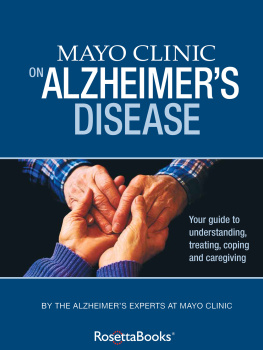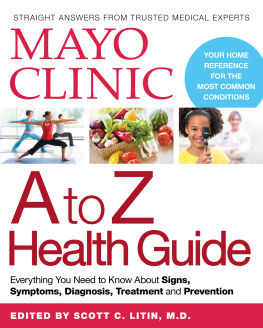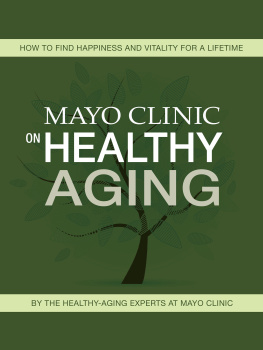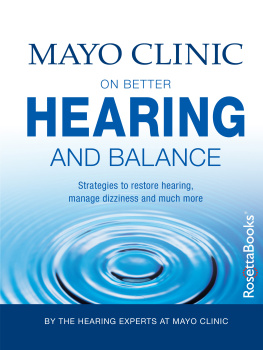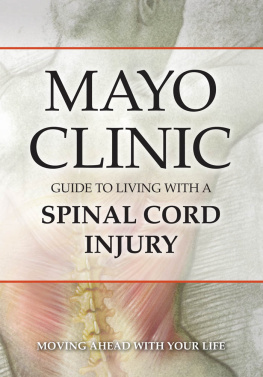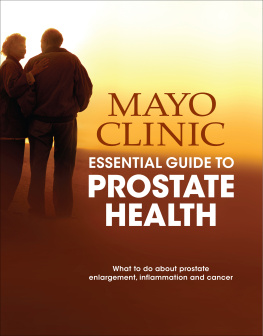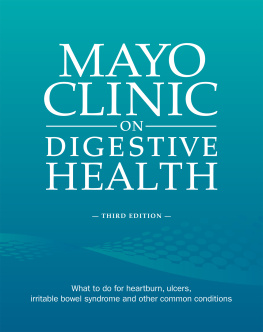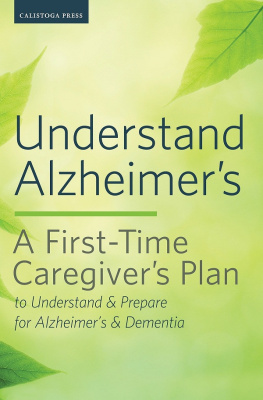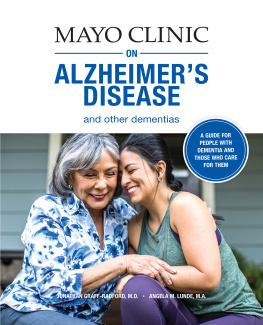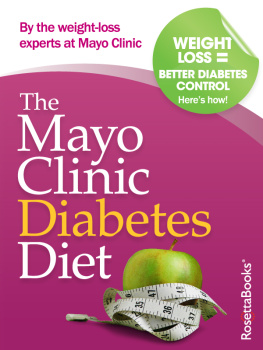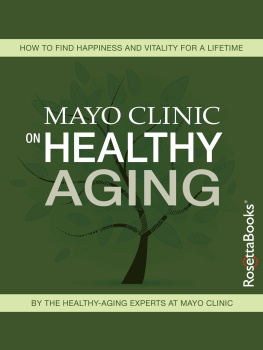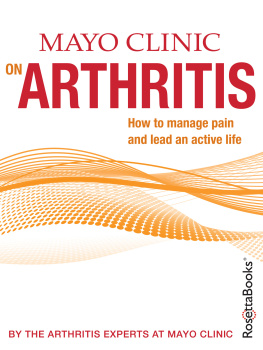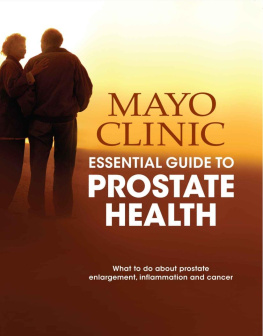
MAYO CLINIC
ON ALZHEIMERS DISEASE
Ronald C. Petersen, Ph.D., M.D.
Medical Editor
Mayo Clinic
Rochester, Minnesota
Mayo Clinic on Alzheimers Disease provides reliable information about the diagnosis and treatment of and caregiving for Alzheimers disease and other causes of dementia. Much of the information comes directly from the experience of health care professionals at Mayo Clinic. This book supplements the advice of your personal physician, whom you should consult for individual medical problems.
This book does not endorse any company or product. MAYO, MAYO CLINIC and the Mayo triple-shield logo are marks of Mayo Foundation for Medical Education and Research.
All rights reserved. No part of this book may be reproduced or used in any form or by any means, electronic or mechanical, including photocopying and recording, or by any information storage and retrieval system, without permission in writing from the publisher, except by a reviewer, who may quote brief passages in review.
For bulk sales to employers, member groups and health-related companies, contact Mayo Clinic Health Solutions, 200 First St. SW, Rochester, MN 55905, or send an email to SpecialSalesMayoBooks@Mayo.edu.
Published by Mayo Clinic
2014 Mayo Foundation for Medical Education and Research (MFMER)
First Edition
ISBN ePub edition: 9780795340789
Editorial staff
Medical Editor
Ronald C. Petersen, Ph.D., M.D.
Managing Editor
Kevin G. Kaufman
Product Manager
Christopher C. Frye
Editorial Director
Paula M. Marlow Limbeck
Creative Director
Daniel W. Brevick
Art Director
Richard A. Resnick
Illustrators
Joanna R. King
Editorial Research
Anthony J. Cook, Amanda K. Golden, Deirdre A. Herman, Erika A. Riggin
Proofreading
Miranda M. Attlesey, Donna L. Hanson, Julie M. Maas
Production
Downtown Bookworks, Inc., New York, NY
Sara N. DiSalvo, project manager
Laura J. Smyth, production person
Contributing Editors and Reviewers
Laura A. Allen, R.N., C.N.P.
Bradley F. Boeve, M.D.
Marla B. Bruns, M.D., Ph.D.
Guojun Bu, Ph.D.
Richard J. Caselli, M.D.
Dennis W. Dickson, M.D.
Daniel A. Drubach, M.D.
Nilufer Ertekin-Taner, M.D., Ph.D.
Tanis J. Ferman, Ph.D.
Yonas E. Geda, M.D.
Neill R. Graff-Radford, M.D.
Robert J. Ivnik, Ph.D., L.P.
Clifford R. Jack, M.D.
Lennon G. Jordan, C.N.M.T.
Keith A. Josephs, M.D.
Kejal Kantarci, M.D.
David S. Knopman, M.D.
Val Lowe, M.D.
John A. Lucas, Ph.D.
Angela M. Lunde
Mary M. Machulda, Ph.D., L.P.
Michelle M. Mielke, Ph.D.
Francine C. Parfitt
Otto Pedraza, Ph.D.
Leonard Petrucelli, Ph.D.
Rosa Rademakers, Ph.D.
Denise A. Reyes
Walter A. Rocca, M.D., MPH
Rosebud O. Roberts, M.B., Ch.B.
Eric G. Tangalos, M.D.
Glenn E. Smith, Ph.D.
Dana M. Swenson-Dravis
Meredith Wicklund, M.D.
Bryan K. Woodruff, M.D.
Steven G. Younkin, M.D., Ph.D.
Indexer
Steve Rath
Administrative Assistant
Beverly J. Steele
Preface
Alzheimers disease may be the defining disorder of our generation. It is estimated that more than 5 million people in the United States have Alzheimers disease today, and this number is projected to triple by the middle of the century. The costs to individuals, families and the healthcare system are incalculable. Moreover, public perceptions come into play. Surveys frequently rank Alzheimers among the greatest health fears. At the same time, its a misperception of many that Alzheimers is a normal part of aging.
With this as motivation, the National Alzheimers Project Act was signed into law in 2011. This legislation requires the federal government to generate a blueprint for dealing with Alzheimers disease in the United States. The National Plan to Address Alzheimers Disease, released in May 2012, is the cornerstone of a concerted effort in research, clinical care and services for fighting the disease. The overall goals of the Plan are to prevent and effectively treat Alzheimers disease by 2025. These are ambitious goals but necessary ones to deal with this devastating disorder.
Mayo Clinic on Alzheimers Disease is intended to help patients, caregivers, families and anyone interested in the disorder understand the underlying nature of the brain, the normal changes that come with aging, and the development of cognitive disorders, including Alzheimers disease. Normal features of brain function are discussed as well as risk factors and treatments for several types of cognitive impairment. The Action Guide is designed to help people deal with many practical issues surrounding the disease. I would like to thank my many colleagues who helped in compiling this information, and hope that this volume will be useful to those who use it. Speaking for my colleagues, we are confident that we can treat Alzheimers disease and reduce its burden on individuals and society.

Ronald C. Petersen, Ph.D., M.D.
Medical Editor
Table of contents
Part 1
Aging and dementia
Chapter 1
Typical aging
Mary feels great. The 67-year-old grandmother eats well, takes daily walks and tends a beautiful garden. She lives in her own home and prides herself on being independent.
Mary is noticing that her memory isnt what it used to be. Shes been misplacing items, such as her purse and car keys. She forgot a doctor appointment last week, and when she came out of the grocery store today she couldnt remember where shed parked the car. She worries that memory slips such as these may signal the end of her independent lifestyle.
John, 78, lives with his wife of 53 years in an apartment complex for seniors. He enjoys meeting with his morning coffee group and visiting family and friends across the country. A former college professor, hes always considered his mind to be sharp. But even though John continues to read extensively and listen to news, hes having a harder time recalling facts. Sometimes, in conversations, his thoughts hang in midsentence as he struggles to find the right word. For John, losing his ability to discuss current events threatens a part of his life that he takes great pride in.
Although Mary and John havent mentioned their concerns to anyone yet, they both fear that these lapses may be indications of something more serious thats developing something like Alzheimers disease.
Alzheimers disease (AD) is the most common cause of dementia and a fear of many adults, primarily those older than age 65. Dementia involves a sharp decline in memory and other cognitive skills that prevents people from being able to carry out the most basic tasks of daily living.
While some people worry obsessively about getting AD, others deny its existence. Yet, in almost every community, you can find someone whos providing care for a parent, sibling or friend who has dementia.
You regularly come across alarming news reports about Alzheimers in print, radio, television and online. Its no wonder that you find yourself second-guessing minor memory lapses and wondering if these incidents arent the first signs of the disease.
A common question
More Americans are reaching old age than ever before. In 2007, average life expectancy had increased to almost 78 years which is 30 years more than Americans were expected to live 100 years ago. And this rising trend doesnt appear to be slowing down. While about 40 million Americans are older than age 65 today, the census data project that more than 88 million people will be in this age group by 2050.
Next page
